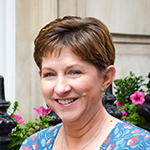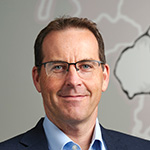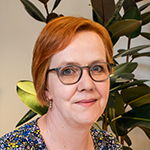My Career with Faith Ward
Published: July 1, 2025
Interviewee:

|
Faith Ward |
Faith Ward has been a driving force in responsible investment for nearly three decades, shaping the UK pensions sector and influencing global standards. Here, she reflects on her journey, challenges, and future priorities.
Before ESG became a mainstream concern, Faith Ward was making the case for responsible investment within the UK pensions sector. For nearly three decades, she has helped shape the way institutional investors think about sustainability, driving progress not just within the LGPS but on a national and global scale.
From her early days at the Environment Agency Pension Fund to her current role as Chair of the Institutional Investors Group on Climate Change and Chief Responsible Investment Officer at Brunel Pension Partnership, Faith has consistently championed the integration of environmental and social factors into investment decisions.
This year, her pioneering efforts were recognised with the award of an MBE in the King’s Birthday Honours. In this interview, she reflects on how it all began, the stand-out moments, the hurdles still ahead and what comes next for responsible investment.
What first sparked your interest in responsible investment, and what is it about the work that still excites or challenges you today?
At university, I studied environmental science and geography. During that time, I identified that if you’re going to address problems, you need to do it within a business context. To follow that through, I took a masters in business strategy and environmental management.
I also joined the Institute of Environmental Management and Assessment. I worked with the Environment Agency on environmental accounting – how to factor the environment into business decisions. Back then, we used terms like environmental finance, which feels full circle now with the rise of sustainability reporting and IFRS standards.
My work with the Environment Agency then migrated into investment. The key bit was recognising that investment allowed you to put your money where your mouth was and incentivise positive contributions by business.
I’m still doing this 25-30 years later because the space continues to evolve, so it’s not boring. There are always new challenges. What we thought was a sensible way of dealing with a problem, even last year, evolves so you’re constantly finding new innovations to solve problems on the business or investment end. There’s never a dull moment.
Looking back on your time at the Environment Agency Pension Fund, what stands out as a defining moment in your stewardship journey?
The key thing with the Environment Agency was the strong mandate for action. You can’t operate in a bubble. You need to have support from your senior leadership behind you to take action. Howard Pearce, Dawn Turner, Craig Martin and Emma Howard Boyd have all continued to set that strong agenda.
That mandate helped to achieve three key moments. In 2000, the Environment Agency reset its investments, redid its strategic asset allocation and appointed mandates that integrated environmental issues and considerations. I think it’s important to acknowledge that first step.
In October 2015, just before the Paris Agreement, the Environment Agency published its climate policy, aiming to align the fund’s investments with keeping global warming below 2°C. It showed we were already thinking ahead and knew the direction we needed to take.
Knowing what was coming that autumn, I began speaking with Adam Matthews at the Church of England Pension Fund about how to turn stewardship ambitions into action. That conversation sparked the idea for the Transition Pathway Initiative, which launched two years later.
You were part of Brunel from its formation – what has it meant to help shape one of the UK’s leading LGPS pools through a responsible investment lens?
It was a fantastic opportunity. We brought into the pool that strong mandate to build on the work of the Environment Agency, Avon and others and an aspiration for other pool members to deliver the greater impact that comes with scale.
The other great thing was we had a blank sheet of paper. Although we had lots to work on, we didn’t have a legacy of mandates. This let us design from scratch based on what we had learned so far. That is not an opportunity many pension funds have had.
That enabled us to deliver changes in asset classes at scale, which was a core goal for Brunel and necessary to gain the support from investment professionals.
Brunel attracted a great team of people and many joined because of that desire to build responsible investment, recognising that it isn’t easy, but wanting to make a difference. We’re still evolving, and sometimes you make mistakes, but that spirit of wanting to have a deeper purpose and align investment objectives with longer-term purposes remains. That was really exciting. It still excites me today, seven years later.
What’s your approach to ensuring Brunel’s RI strategy stayed effective amid fast-changing expectations around net zero, nature, and social impact? And how do you define effective?
We ask, “How do we know we’re doing the right thing?” Last year, we took a step back and took stock of what we were doing, what was working well and what needed improvement. Being critical and taking that moment for evaluation allowed us to refresh our objectives for our work.
Many responsible investors, including Brunel, try to tackle everything. It’s very hard to say this is more important than that. Often there are people’s lives and livelihoods at stake, so they’re emotionally charged topics. Issues like human rights, climate change and AI are not issues you can do in a dispassionate way.
We must accept we can’t do everything and focus on where we add most value. The industry is learning to be more targeted while collaborating to ensure all areas are covered by those best suited, based on their skills or mandates.
You’ve worked across numerous global responsible investment networks and coalitions. How has that collaboration helped Brunel and the wider LGPS drive systemic change?
It comes back to that we can’t do everything, nor do we have the expertise to. The more you can act collaboratively, the more efficient it is because managers hear a consistent message.
The LGPS has always been at the forefront of pushing for transparency because the funds themselves are publicly accountable in a way that isn’t common. The LGPS understands the importance of being accountable for progress or investment decisions because of the scrutiny it is subjected to.
Many coalitions have helped with commonality in local government priorities. I chair the Institutional Investor Group on Climate Change, which has large LGPS funds and pools. The Net Zero Investment Framework provides consistency on what good net zero investment looks like.
For diversity, there’s the Asset Owner Diversity Charter, started at Brunel and now led by Helen Price at the Church of England, plus the 30% Club, and other initiatives which help to set asset owner expectations.
How do you balance local accountability to partner funds with global engagement issues, such as deforestation or supply chain human rights risks?
We feel accountable to beneficiaries, so we focus on communication. Our outcomes report shows how we manage their assets in line with their interests and our policy commitments – which are themselves shaped by our partner funds. We do outreach with pensions committees, such as attending member days. The members are interested in how we are bringing about change locally and globally.
That said, we need to improve how we explain how our international work connects with what beneficiaries expect. Some question how our focus on global policy relates to their portfolios. But roles, such as mine in the Investor Advisory Group of the International Sustainability Standards Board, help set disclosure standards that guide decisions in portfolios and show progress on climate goals.
With biodiversity, social equity, and regulatory scrutiny all rising up the agenda, what are the top responsible investment priorities on your desk right now?
We narrowed seven focus areas to three top priorities – climate, biodiversity and nature, and human rights and social – where we’ll concentrate our resources. The other four remain vitally important but will be addressed mainly through collaboration and stewardship.
Human rights data is a key gap, though projects led by the Church Commissioners are helping. On the social side, we focus on local investments like energy efficiency and affordable housing to make a real impact in communities.
What gives you hope for the future of responsible investment – and what areas do you think still need a wake-up call?
I’m hopeful we will come out of this challenge process stronger and regain the confidence that responsible investment is a robust framework for investing, and we’ll get support from policy makers. I believe it will still attract many to join the financial services industry. Though rough patches can deter people, we need and want to embrace the next generation’s insights.
The wake-up call is physical climate risk. Physical climate risk adaptation and resilience is under-priced and under-explored. Our systems and data underestimate this risk, which contributes to the slow level of climate action because we’re under-selling the physical component.
What advice would you give to someone starting out in the investment world who wants to make a real impact in ESG or stewardship?
You cannot even begin to know everything that is relevant to this area of investment as it touches all sectors, in all asset classes, in all geographies, but in different ways, on different timescales. So, don’t try, it is futile and exhausting. Instead, put the energy into developing a great network, all of whom will have areas of interest and potentially deeper knowledge, share and support each other extensively, and in particular, draw on the knowledge, and mistakes, of those who have gone before you. Responsible investment and stewardship are rapidly evolving, so many things may have been tried before. But learn and improve, whilst also going gently on us oldies for the missteps: we were breaking new ground.
More Related Content...
|
|
|



